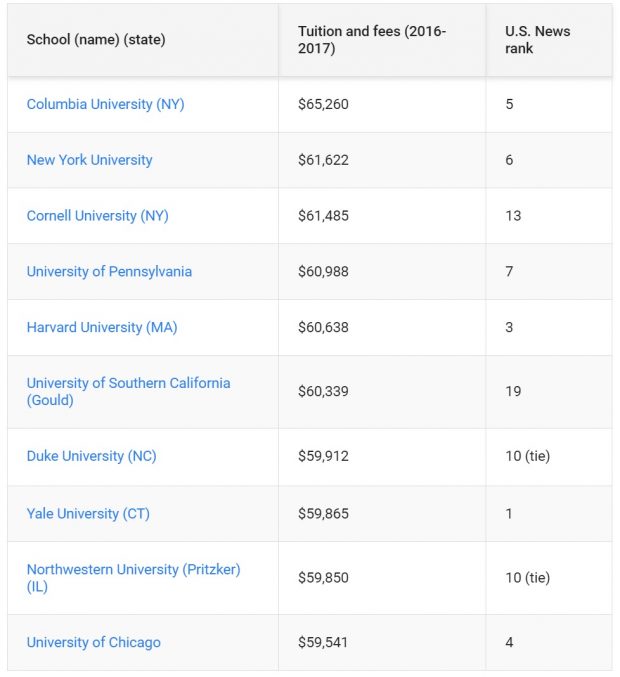The 10 Law Schools With The Highest Tuition (2016-2017)
Choose your law school wisely.
 We all know that a legal education can land the average law school graduate in up to six figures of debt, and we all know that egregiously high tuition costs are to blame. According to the latest data from U.S. News, the average cost of tuition and fees at private schools for the 2016-2017 academic year was about $43,020, while the average in-state and out-of-state cost of tuition and fees at public schools was about $26,264 and $39,612, respectively.
We all know that a legal education can land the average law school graduate in up to six figures of debt, and we all know that egregiously high tuition costs are to blame. According to the latest data from U.S. News, the average cost of tuition and fees at private schools for the 2016-2017 academic year was about $43,020, while the average in-state and out-of-state cost of tuition and fees at public schools was about $26,264 and $39,612, respectively.
But which law schools had the most costly tuition for the 2016-2017 academic year?
The Short List blog of U.S. News has compiled a ranking for that, and it’s not at all shocking that all 10 schools that made the list are private. At these law schools, the average tuition and fees for the current academic year was $60,950.

Is The Future Of Law Distributed? Lessons From The Tech Adoption Curve
Here are the top 10 law schools with the highest tuition:

If you think that you can go to any public law school to avoid these ridiculous tuition costs, then you may want to think again. Here’s more information from U.S. News:
Although public law schools can sometimes be a cheaper alternative, there are a few public law schools that charge out-of-state students more than $58,000 annually in tuition and fees. These schools include the University of Virginia, the University of Connecticut and the University of Michigan—Ann Arbor, which charged out-of-state students $59,300, $58,802 and $58,012, respectively, for the 2016-2017 year.
Sponsored

Generative AI In Legal Work — What’s Fact And What’s Fiction?


Is The Future Of Law Distributed? Lessons From The Tech Adoption Curve

The Business Case For AI At Your Law Firm


The Business Case For AI At Your Law Firm

It’s certainly worth noting that the private law schools that made this list are among the best in the country. At highly ranked schools like these, you get what you pay for, and in the law school world, that usually means a high-paying paid job as an attorney that will allow you to service your enormous debt obligations in a timely fashion — and to be quite frank, that’s priceless.
No matter where you decide to go to law school, make sure that you evaluate what your payoff will be when graduation time rolls around. Given the information that’s readily available online, will you be able to find a job? Will you be able to make ends meet while making payments on your law school loans? If you don’t think the answer to these questions are “yes,” then you may want to consider another school.
How can you do that? Here at Above the Law, we’ve got a law school ranking that takes into account both employment outcomes and cost of education, and we’ll be releasing the latest version of it soon. Let us help you choose your law school wisely.
10 Law Schools That Charge the Most [The Short List / U.S. News]
Sponsored

Legal AI: 3 Steps Law Firms Should Take Now

Navigating Financial Success by Avoiding Common Pitfalls and Maximizing Firm Performance
 Staci Zaretsky is an editor at Above the Law. She’d love to hear from you, so feel free to email her with any tips, questions, or comments. You can follow her on Twitter or connect with her on LinkedIn.
Staci Zaretsky is an editor at Above the Law. She’d love to hear from you, so feel free to email her with any tips, questions, or comments. You can follow her on Twitter or connect with her on LinkedIn.







